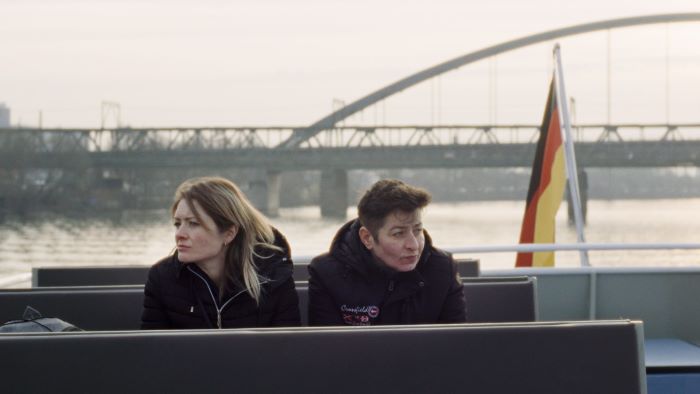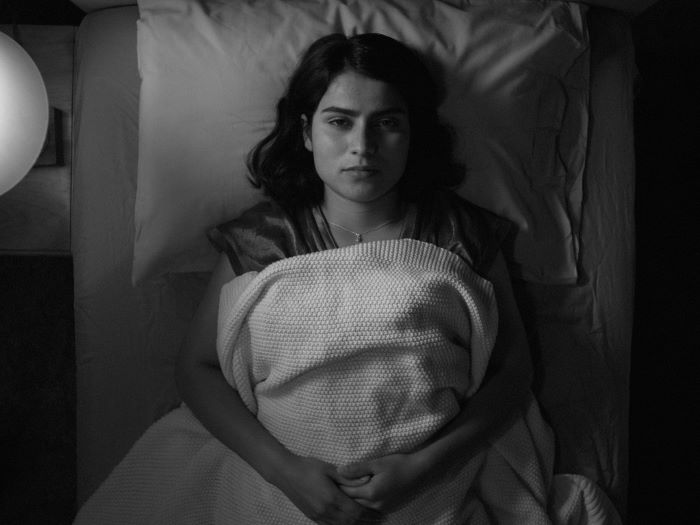New York’s Museum of the Moving Image’s First Look annual festival spotlights emerging filmmakers from around the world, and offers a sneak peak of some selections that will be in theaters later this spring: Eight Mountains, winner of the Best Screenplay prize last year at Cannes, Love Life, an elegant take on l’amour fou, which premiered at Venice, and a return to form for Jean-Pierre Dardenne and Luc Dardenne, Tori and Lokita. Many in this year’s lineup have recently won acclaim at the Slamdance and Sundance festivals in January, such as the three titles below. Though dissimilar, they have at least one commonality. Anxiety about the changing world animates, in different ways, this trio.
In Marek Kozakiewicz’s Silent Love, Agnieszka returns home to Poland from Germany following the death of her mother. She is 35, and has a much younger brother, Milosz, who is in his early teens, and she seeks to become his primary caretaker. As she prepares him for their first meeting with social services, she seems anxious about how they present themselves, and quizzes him on what he is going to say. Milosz is bespectacled, a little awkward, and charming. Still, the causes for Agnieszka’s anxiety are not immediately clear. When she returns to Germany for a quick weekend, they become clear. She has left her partner, Majka, in Frankfurt, and is hoping to find a way to either convince Majka to move to Poland or Milosz to live in Germany, while Poland is becoming increasingly intolerant of homosexuality. As a result, the authorities can’t find out about her private life if she is to become Milosz’s foster parent.
The documentary follows these three individuals as they tentatively make their life together and wait for Agnieszka’s petition to be approved. Much of the action is outwardly calm. While it is rare to see anyone really raise their voice, it is equally rare for any area of uncertainty to disappear. The Polish countryside, where Agnieszka and Milosz live, is evoked with clarity, beauty, and without sentimentality. As Majka watches a TV program about the rising intolerance toward LGBTQ rights, or Milosz participates in a high school dance routine, where the instructor is strict about gender roles, we feel less that we are observing these three and more that we have happened to stumble upon them.
The achievement of this subtle and poignant film is precisely this: to have married a naturalistic, outwardly calm atmosphere with one of paranoia and uncertainty. Even in the household’s most happy moments, the feeling of scrutiny never disappears, the countryside never appears simply beautiful and safe. Neither hope nor fear is allowed to dominate.
Filmed in Benin, Nigerian filmmaker C.J. “Fiery” Obasi’s Mami Wata is not specific about time and place; it takes place on a mythic plane rather than a prosaic one. In an unnamed village by the sea, the community give offerings to Mama Efe (Rita Edochie), the intermediary who communicates with the water goddess Mami Wata. This is how it always has been, yet the film opens at a time of restlessness. Mama’s daughter, Zinwe (Uzoamaka Aniunoh), who is expected to be the next intermediary, runs away, increasingly fed up with the injustice of what good fortune Mami Wata does and does not bestow. Meanwhile, Prisca (Evelyne Ily Juhen), Mama’s adopted daughter, is sympathetic to advances in modern medicine, and is often, against Mama’s wishes, seeking to bring medication to the village rather than to leave fate in the fickle hands of Mami Wata. When Prisca welcomes a handsome stranger from a far away, war-torn country and nurses him back to health, seeds of dissent against the deity are sown in the village, and violence erupts.
To say that this glistening black-and-white movie is photographed beautifully doesn’t begin to cut it. Not only are there eerie, evocative shadows, but there are unlikely and surprising uses of the contrast between black and white, especially regarding shots of the ocean. As such, it is both visually enchanting and bewitching, ideally suited to its mythic story.
The characters often speak in a heightened, no-nonsense manner, as if they walked straight out of an ancient epic. The cast commits fully to this mode of expression and, consequently, most of the time this works. Still, the ancient village threatened by modernity trope feels overly familiar partially because the villains here are, sometimes, little more than caricatures, and Jasper (Emeka Amakeze), the handsome outsider, does not have a convincing arc from sympathetic stranger to antagonist. Nevertheless, the film is admirably bold, and offers its fair share of spectacle and supernatural shivers. It is most intriguing when it suggests that, in spite of the fickleness of God, it is even more perilous to live in a godless society.
Fremont is also in black-and-white, and straddles the line between the real and the strange. The world director Babak Jalali creates is, outwardly, humdrum. It begins in a fortune cookie factory, where Donya (Anaita Wali Zada) works. Joanna (Hilda Schmelling) blankly discusses blind dates with her, while an older woman types frantically away making up the fortunes the cookies will conceal. At night, Donya returns home to an apartment complex she shares with many other Afghan immigrants in the titular Bay Area city. One of them has given her an appointment with his psychiatrist, Dr. Anthony (Gregg Turkington), so that she can obtain sleeping pills. Her memories, we think, are what stand in the way of rest.
Donya was a translator for the U.S. Army in Afghanistan, for which she was seen as a traitor by many of her own people. As Dr. Anthony discovers, she does not talk about this experience willingly, and she is not especially curious about analyzing her emotions. As she says, she just wants sleeping pills. Yet this film finds her looking where she can for some kind of peace and solace, rarely if ever describing the horrors she has experienced. There are no flashbacks—we are left to imagine them as well. Everyone who tries to help her seems well-intentioned but clueless. Eventually, she expresses her guilt for wanting love and happiness when she is aware of all the suffering back home.
This is a much odder film than the above summary suggests. Almost all the dialogue in English is blunt and awkward, sometimes humorously so, whereas the Afghan characters are more naturalistic when communicating in their native tongue. The intention is clear: to make the world Donya is trying to inhabit feel stilted and alien, yet the bluntness is not always to its credit. Sometimes, the film wears its themes too much on its sleeve. That being said, there are some darkly humorous touches, and the film is a more surprising ride than one might expect. Just as I was preparing for a therapy session in which Donya let down her guard and finally discussed all her horrible memories, it swerved and became something very different. It is these unsuspecting touches, and its surprising optimism, that make this film worthwhile.









Leave A Comment